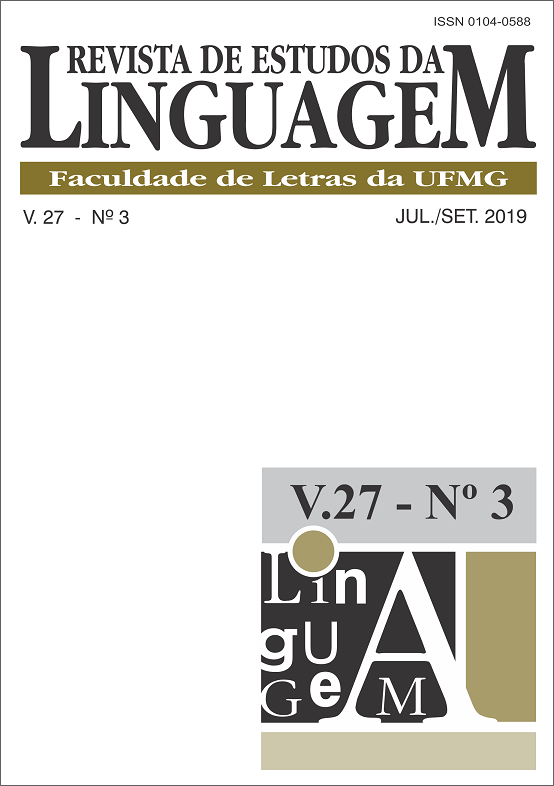Os sentidos deônticos na peça teatral The Glass Ménagerie / Deontic Meanings in the Play The Glass Ménagerie
DOI:
https://doi.org/10.17851/2237-2083.27.3.1195-1231Palavras-chave:
modalidade deôntica, uso, sentidos, deontic modality, use, meanings.Resumo
Resumo: A fim de compreender a língua sob a perspectiva discursiva textual, o trabalho se propõe a investigar a categoria modalidade deôntica em dois contextos específicos: os diálogos dos personagens e os enunciados de abertura ou fechamento das cenas contidas na peça teatral The glass ménagerie, diálogos cujo enfoque é a construção dos sentidos na geração do caráter dominador dos personagens. Para tal finalidade, são considerados os aspectos sintáticos, semânticos, e pragmático-discursivos desses enunciados. Palmer (2001), Bybee (1995), Bybee, Perkins e Pagliuca (1994), Furtado da Cunha e Souza (2011), dentre outros, dão suporte ao estudo. Dentre os itens que expressavam modalidade, quanto ao tipo de modalidade, identificamos 50,9% de modalidade orientada para o agente e 49,4% orientada para o falante. No que concerne ao valor, 59,5% de obrigação foram revelados nos dois tipos de modalidade supracitados. Por fim, o estudo contribui para a construção do mapeamento dos sentidos ligados à modalidade em diversos contextos de uso na peça teatral.
Palavras-chave: modalidade deôntica; uso; sentidos.
Abstract: In order to understand language under a textual discursive perspective, the paper aims at investigating the category of deontic modality in two specific contexts: the characters’ dialogues and opening and closing statements of the scenes within the play The glass ménagerie, dialogues whose focus is on the construction of meanings in the generation of the dominating characters. For this purpose, syntactic, semantic, and pragmatic-discursive aspects of such statements will be considered. Palmer (2001), Bybee (1995), Bybee, Perkins and Pagliuca (1994), Furtado da Cunha and Souza (2011), among others, give support to the study. Among the items that expressed modality, as to the type of modality, we identified 50,9% of agent-oriented modality and 49,4% of speaker-oriented. Concerning value, 59,5% of obligation was revealed in the two types of modality above mentioned. At last, the study contributes to the mapping of meanings associated with modality in the various contexts of use in the play.
Keywords: deontic modality; use; meanings.





